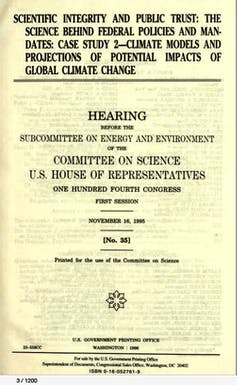By Richard B. Rood, University of Michigan
Scott Pruitt, the Administrator of the Environmental Protection Agency, has called for a “red team-blue team” review to challenge the science behind climate change. “The American people deserve an honest, open, transparent discussion about this supposed threat to this country,” he said on a radio show, adding he hoped to hold the exercise in the fall.
Most commonly, red team-blue team reviews are used as a mechanism to improve security of information systems or military defenses. The blue team is associated with an institution, the owner of an asset or a plan. The red team is charged with attacking the blue team, with the goal of revealing vulnerabilities.
I have participated in red team-blue team exercises and in many reviews that share characteristics with their philosophy. Whether the review is cast as a hostile intruder, a devil’s advocate or scenario planning, there is always the spirit of challenge by an antagonist.
This can take many forms. As a climate researcher, I have participated in reviews where weather and climate projects were investigated for budget reductions. Others examined the role of high-risk research and technology along the critical path of a project. I have participated in studies of management acumen and how projects fit into a national and international political and scientific context.
I have also participated in forums of scientific debate. This is where scientists provided evidence supporting competing arguments to explain unresolved observed behaviors. The arguments were testable, hence, scientific hypotheses. From my experience in both types of review, I can say confidently that red team-blue team exercises are not a mechanism for scientific debate.
They are not designed to take a testable hypothesis and then look at whether observations and theory support or refute it. They are more like Heath Ledger’s Joker in The Dark Knight, causing disruption, distortion and chaos.
And so, Pruitt’s call for a red team-blue team review is not designed to test the scientific robustness of our knowledge of climate change. Rather, it is part of the political strategy to continue the dissolution of the EPA’s climate change activities and to destroy President Obama’s efforts to address climate change — something Pruitt and the Trump administration have made their stated goal.
Scientific Reviews of Climate Science
Administrator Pruitt’s call for a red team-blue team review has been discussed by a number of other scientists. In a Washington Post commentary, Ben Santer, Kerry Emanuel and Naomi Oreskes discuss peer review and its checks and balances. Former Director of the Office of Science and Technology Policy John Holdren, in the Boston Globe, takes on the political nature of Pruitt’s position and documents the extensive reviews of climate change science by many organizations.

These many reviews of climate change science are motivated by the consequences of climate change. The disruptions to the world are enormous and costly. To intervene and limit those disruptions requires changes in how we use energy, and essentially, the elimination of fossil fuel emissions. For decades it has been in the best interest of our prosperity and environmental security to get the answer on climate science right. Hence, reviews have been carried on from many perspectives.
Indeed, law professor Daniel Farber has reviewed the practice of climate science and concluded, “Climate scientists have created a unique institutional system for assessing and improving models, going well beyond the usual system of peer review. Consequently, their conclusions should be entitled to considerable credence by courts and agencies.”
Farber not only cites the attributes of peer review, but also the extensive community efforts to compare and improve the computer models scientists use to project future climate change. Further, the review process of the Intergovernmental Panel on Climate Change contributes to the robustness of the basic conclusions that the Earth’s surface air temperature will warm, ice will melt, sea level will rise and the weather will change.
So the scientific investigation of the Earth’s climate does not suffer from a lack of scrutiny.
Political Challenges to Climate Science
In addition, climate change science has been the target of political and public debate for decades. In 1995 the U.S. House of Representatives Committee on Science held hearings on the integrity of climate models. The results of those hearings persist today in the political and societal discourse, and there have been many subsequent political hearings.
The political and public attacks on climate science have led to reactionary research. This research has served to strengthen the foundation of climate science. On the other hand, no findings have seriously challenged that foundation. Therefore, resources have been spent, and we have delayed action on climate change to check the dots on the i’s.

Administrator Pruitt’s call for the red team-blue team review seems inspired by a Wall Street Journal commentary by physicist and New York University professor Steven Koonin, who called for an adversarial, public red team-blue team review of climate science. Koonin maintained that such a review would be a step toward “evidence-based policymaking and against the politicization of science.” A goal would be to “Put the ‘consensus’ to a test, and improve public understanding, through an open and adversarial process.”
In my view, however, the “consensus” argument to support the correctness and the reliability of climate change is poorly posed. It is an argument based on polls that maintain that an overwhelming majority of climate scientists have accepted the basic conclusions of a warming climate. The consensus argument likely emerged as a tactic for communication, but it is not a prudent tactic. It sets up a choice: Whose side are you on? Who or what do you believe?
More fundamentally, the consensus argument is not an argument of climate science; it’s one of communication or political science. Hence, putting “consensus” to the test is not accomplished by an adversarial review of climate science. An adversarial review of climate science, especially one motivated by a hostile political appointee, serves only to escalate the politicization of climate science and undermine evidence-based policy making.
Been Here Before
At the beginning of the Bush-Cheney administration in 2001, the White House asked a committee of the National Academy of the Sciences for a short-fuse, less-than-one-month evaluation of the key uncertainties of climate science as well as an analysis of the Intergovernmental Panel on Climate Change summary reports. The committee included professor Richard Lindzen, frequently cited as a climate change skeptic in the public media.
The committee stated in their conclusion, “The committee generally agrees with the assessment of human-caused climate change presented in the IPCC Working Group I scientific report, but seeks here to articulate more clearly the level of confidence that can be ascribed to those assessments and the caveats that need to be attached to them.”
During the 1990s there were many reviews of climate science and proposed climate programs. As one example, JASON Reviews were an especially interesting form of review. I made presentations at these reviews. Professor Koonin took part in these reviews as well.
According to the Federation of American Science, “JASON is an independent scientific advisory group that provides consulting services to the U.S. government on matters of defense science and technology. It was established in 1960.” JASON was formed originally by scientists, mostly physicists, associated with the World War II Manhattan Project. They have been used to review climate science several times, and their membership has included those counted as climate skeptics, for example, Freeman Dyson.
The JASON review has some elements of a red team review — an independent team of highly trained and accomplished scientists examines proposed and existing research programs.
I never saw any indication of the JASON panel questioning the underlying tenets of climate science or the methodology of climate scientists.
What Pruitt’s Review Is Really About
Given the many instances of scientific, political and policy reviews over decades, one cannot legitimately argue that an adversarial-style process will shed light on core climate science.
Instead, what Pruitt has proposed has all of the characteristics of formalizing as behavior, if not policy, a federal disruption of climate policy.
His tactic can be viewed only as spectacle to advance a political agenda. Such spectacle will be based on emotional appeal and will rely on manipulating the message about the role that uncertainty plays in scientific investigation. The goal will be the amplification and persistence of public doubt — a goal that would be undoubtedly achieved.
Richard B. Rood is Professor of Climate and Space Sciences and Engineering at the University of Michigan.
This article was originally published on The Conversation. Read the original article.
Main image: Having an antagonistic debate over climate change will not shed any more light on the fundamentals of climate science. Credit: Ivica Drusany/Shutterstock.com
Subscribe to our newsletter
Stay up to date with DeSmog news and alerts







